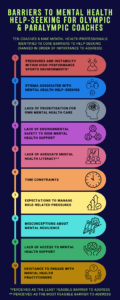This blog summarises a recently published study in BJSM investigating barriers to mental health help-seeking among Olympic and Paralympic coaches.
Why is this study important?
Olympic and Paralympic coaches face a range of stressors that may compromise their mental health and wellbeing. These demands may include the pressure of having to qualify for a Games, managing resources and performance objectives set by national governing bodies, frequent travel, social isolation, and persistent job insecurity [1]. Considering these pressures, current research indicates that elite-level sports coaches are susceptible to a range of symptoms and disorders associated with mental ill-health, including depression, anxiety, adverse alcohol use and burnout [2].
To reduce the risk of Olympic and Paralympic coaches experiencing mental ill-health or a mental health crisis, help-seeking is considered an effective early intervention strategy [3]. While current research suggests that stigma, a fear of deselection and confidentiality-related concerns may operate as barriers to help-seeking for elite athletes [4], little is known about factors that influence help-seeking among elite coaches, including Olympic and Paralympic coaches.
To address this research gap, our study examined the perceived challenges that limit mental health help-seeking in Olympic and Paralympic coaches. In addition, to inform sporting organisations and bodies about ways to reduce barriers to help-seeking, our study also aimed to identify which challenges were viewed as most and least important and feasible to address.
How did the study go about this?
In total, 10 Olympic and Paralympic coaches and 9 mental health professionals who worked with Olympic and Paralympic coaches participated in our mixed-methods group concept mapping study. Participants were initially asked to provide as many single-idea responses to the prompt:
“What makes it challenging for an Olympic or Paralympic coach to seek help for their mental health?”
Once all participants had responded to the focus prompt the research team reviewed each participant-generated statement to remove and synthesise irrelevant, unclear and duplicate responses. With a finalised list of 68 unique statements, participants were then asked to sort each statement into groups that made sense to them. Participants also rated the importance and feasibility of each statement by responding to the following questions:
“On a scale of 1 (least important) to 5 (most important), how important do you think this challenge is to Olympic and Paralympic coaches seeking mental health support?”
and
“How feasible do you think it is to do something about this challenge?”
What did the study find?
Ten core challenges that limit Olympic and Paralympic coaches from seeking mental health support were identified, including:
(1) Pressures and instability within high-performance sports environments
(2) Stigma associated with mental health help-seeking
(3) Lack of prioritisation for own mental health care
(4) Lack of environmental safety to seek mental health support
(5) Lack of adequate mental health literacy
(6) Time constraints
(7) Expectations to manage role-related pressures
(8) Misconceptions about mental resilience
(9) Lack of access to mental health support
(10) Hesitance to engage with mental health practitioners
Overall, participants perceived ‘pressures and instability within high-performance sports environments’ as the most important, yet least feasible barrier to address. Conversely, a ‘lack of adequate mental health literacy’ was considered the most feasible challenge to address.
What are the key take-home points?
We found that Olympic and Paralympic coaches encounter a range of individual, cultural and environmental factors that act as barriers to seeking help for their mental health. While systemic factors were generally viewed as the most important barriers to resolve (e.g. pressures and instability within high-performance sports environments, stigma associated with mental health help-seeking), these factors were largely considered least feasible to address. While sports organisations should prioritise tackling culturally embedded barriers to help-seeking, dynamic individual factors with high feasibility may offer short-term solutions (e.g. offering evidence-based mental health literacy programs).

Authors Information
Joshua Frostab, Courtney C. Waltonbc, Alex Donaldsonde, Simon M. Ricebf and Rosemary Purcellab
a) Centre for Youth Mental Health, The University of Melbourne, Australia
b) Elite Sports and Mental Health, Orygen, Melbourne, Australia
c) Melbourne School of Psychological Sciences, The University of Melbourne, Melbourne, Australia.
d) Centre for Sport and Social Impact, La Trobe Business School, La Trobe University, Melbourne Australia
e) Australian IOC Research Centre, La Trobe University, Melbourne, Australia
f) Movember Institute of Men’s Health, Richmond, Victoria, AustraliaX: @joshfrost77
References
- Norris, L. A., Didymus, F. F., & Kaiseler, M. (2017). Stressors, coping, and well-being among sports coaches: A systematic review. Psychology of Sport and Exercise, 33, 93-112. https://doi.org/10.1016/j.psychsport.2017.08.005
- Frost, J., Walton, C. C., Purcell, R., Fisher, K., Gwyther, K., Kocherginsky, M., & Rice, S. M. (2024). The Mental Health of Elite-Level Coaches: A Systematic Scoping Review. Sports Medicine – Open, 10(1), 16. https://doi.org/10.1186/s40798-023-00655-8
- Frost, J., Walton, C. C., Purcell, R., & Rice, S. M. (2023). Supporting The Mental Health Of Elite-Level Coaches Through Early Intervention. Arthroscopy, Sports Medicine, and Rehabilitation, 5(4). https://doi.org/10.1016/j.asmr.2023.04.017
- Cosh, S. M., McNeil, D. G., Jeffreys, A., Clark, L., & Tully, P. J. (2024). Athlete mental health help-seeking: A systematic review and meta-analysis of rates, barriers and facilitators. Psychology of Sport and Exercise, 71, 102586. https://doi.org/10.1016/j.psychsport.2023.102586